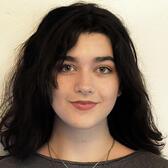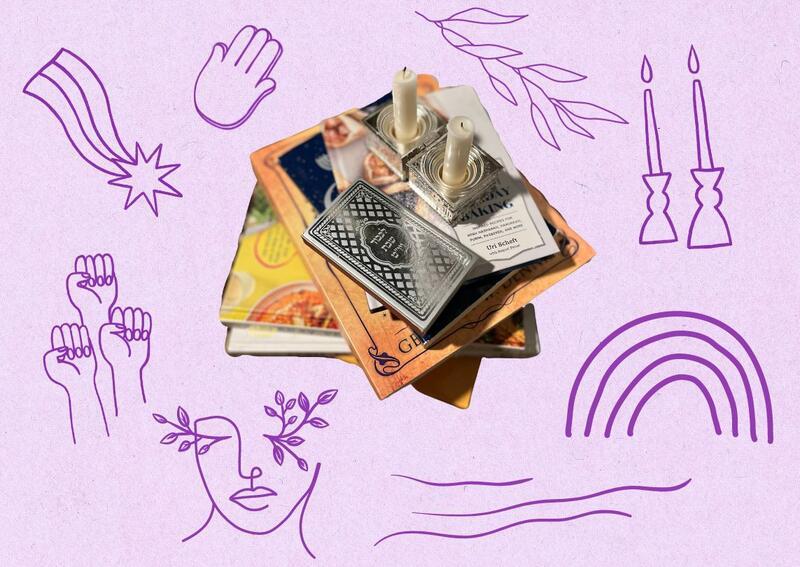Setting My Feminist Intentions with Shabbat
Nestled between the other shops and restaurants on Murray Avenue sits the only Judaica shop in Pittsburgh. It was there that–after months of just missing their open hours–my mother and I walked between towering stacks of decor, candles, mezuzahs, kippahs, and books on just about every topic ever argued by rabbis. Moving narrowly past a few boxes of Stronger Than Hate merchandise, I spotted a shelf filled with Shabbat candle holders. Growing up in a secular, matrilineal family, I had really only connected with my Jewish heritage through Chanukah, family history, and the foods we ate. Exploring Shabbat observance felt like a huge step, and a risky one at that: what if I tried practicing it, and I found that some fundamental part of me didn’t work the way that Jews who had grown up going to synagogue and summer camp and Hebrew classes did? How could I ever earn the years and years of knowledge required to be a “good Jew”? Pushing my anxieties aside, I showed the cheapest one, a silver candle holder that held two candles and folded neatly into a box, to my mom, and we left with a mezuzah and a candle holder in tow.
Months of practice later, I’ve figured out what lighting the candles means for me. Every Friday night, I am able to send my troubles away for a few minutes in favor of ritual. I recite the blessings I worked to memorize, physically close my eyes to the world, and light my candles. I circle my hands three times around the flames, bringing the light of Shabbat towards my body. This candle-lighting is based on intention – we choose to set aside this time to welcome in peace and spiritual light. It clears the worldly stresses of the week and allows us to refocus our energy in preparation for the coming week.
For me, the biggest draw of welcoming in Shabbat in this form is its connection to tradition. Lighting the candles has historically been the role of Jewish women and girls. For millennia, women just like me have dedicated moments of their busy lives to this moment of intention. I can imagine another teenager, centuries before me, stumbling over the same lines of Hebrew and laughing under her breath. It’s an immense comfort to imagine that line of women, stretching back to the earliest years of our history. The anxiety I feel was once shared by them, and that knowledge lightens the burden.
During Shabbat, many Jews withdraw from the world in key ways. We focus our energy inward and upward, attend services within our communities, reflect on ourselves, and rest for the new week. I don’t follow a very strict observance; right now, it isn’t realistic for me to refrain from work or to avoid electronics every Saturday. Instead, Shabbat for me means having an honest look inward. I reflect on the ways I have acted, the potential harms I have caused, and the way I want to act in the future. It is a time to consider the negatives and to welcome the positives. In the terms of Shabbat, it’s dispelling the dark with light. I find that this philosophy is mirrored in feminist activism.
To be an effective activist, I believe that a person has to do the internal work first. Without working towards correcting our internal flaws, we risk them seeping into our activism. This is hugely important when deconstructing our biases — too often, the burden of identifying biases is put on the shoulders of those bearing the brunt of that casual, unrealized bigotry. Feminism is often defined as the right to choose — our reproductive decisions, consent, career choices, and even how we define feminism to ourselves. But I believe that this choice applies not only to the issues we advocate for, but also the way we fight for and support each other. Like Shabbat, feminism is about intentionally making choices. What do we intend to bring into feminist spaces? What do we choose to leave out?
In a broader historical context, proponents of feminism have always had to reckon with what they include and exclude. The early suffragettes, like Susan B. Anthony and Elizabeth Cady Stanton, fought for the vote but argued vehemently against the Black male vote, excluding Black women from the conversation entirely. In the early 1900’s, upper-class feminists focused on their vote to the detriment of working-class women organizing for their labor rights. White activists in the second wave of feminism included the fight for reproductive equality and access to abortion, but they often excluded the fight against the forced sterilization of disabled, Indigenous, and Black women. Lesser publicized groups fought against this exclusion, like the Combahee River Collective, a group of Black feminists, which formed in 1974 to define the specific struggles faced under racialized patriarchy. In the Combahee River Collective Statement, the group writes that their members have worked on issues like “sterilization abuse, abortion rights, battered women, rape and health care…As Black feminists we are made constantly and painfully aware of how little effort white women have made to understand and combat their racism.”
We often talk about these issues in the past tense, yet racism and classism in mainstream feminism persists. The beginning of the 2000’s saw a movement towards women’s representation in male-dominated positions of power, excluding a call for a reexamination of class hierarchy as a whole. In what some consider the current new wave of feminism, born out of online activism, we must continue to take an honest look inward, especially at the ways we exclude certain groups. We also have to make more space for conversations on what we choose to bring into our spaces, from the literature we read to the slogans we use to whose voices we amplify loudest at our protests.
Activism is a commitment — we make an active choice every day to stand for the issues we believe in. Effective feminists must follow the same procedure that some Jews practice each Shabbat. We must find a time to practice intention, to rest and look inward, and then to emerge into the new week with a refocused perspective. When I unfold my little silver candle holder and light the flames, I bring in the light of a commitment to practicing the tradition of my culture, alongside my feminism. Circling the flames, I welcome in the opportunity to grow with each week, to expand to fill the footsteps of all the Jewish feminists before me.
This piece was written as part of JWA’s Rising Voices Fellowship.








Great article which inspired me to
Do
More reading on this topic . Has the author written any other pieces or could you recommend any to be used for a women’s themed Shabbat ? Thank
You !